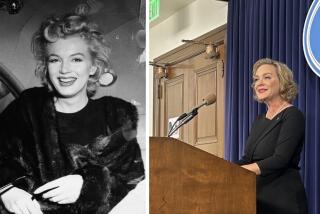Imelda Marcos Owns U.S. Home Worth Millions, Congress Told
- Share via
WASHINGTON — Amid charges that Democrats in Congress are meddling in next month’s election in the Philippines, a House subcommittee heard testimony Tuesday that First Lady Imelda Marcos secretly owns a $19-million mansion on Long Island.
Rep. Stephen J. Solarz (D-N.Y.), chairman of the House Foreign Affairs subcommittee on Asia and the Pacific, said the Marcos family owns properties in the United States valued at more than $350 million. He promised to use future hearings to expose the “complex web” of companies used to conceal these investments.
But Rep. Toby Roth (R-Wis.) argued that none of the documents produced by witnesses and the committee staff proved conclusively that Imelda Marcos owns the Long Island estate. He charged Solarz with trying to use the hearings to help defeat her husband, President Ferdinand E. Marcos, in the Feb. 7 Philippine election.
Influence Charged
“This is nothing in my opinion but an attempt to influence democratic elections in another country,” Roth said. “Let the people of the Philippines decide this election.”
Solarz countered that the subcommittee’s investigation was already under way before Marcos scheduled the election. He asserted that the hearings are necessary for Congress to determine whether it should continue giving $250 million a year in military aid to the Marcos government.
“The purpose of this hearing is not to influence the political process of the Philippines,” he said. “The purpose of this hearing is to inform the Congress of the United States.”
Marcos, who receives a presidential salary of $5,700 a year, repeatedly has denied that either he or his wife owns real estate in the United States.
At issue in the hearings is a Long Island estate known as Lindenmere, which was purchased in 1982 by men identified by subcommittee witnesses as Imelda Marcos’ associates for the purpose of conversion into luxury condominiums. Witnesses testified that the conversion was halted when she decided to use Lindenmere as her own country estate.
The subcommittee heard from three lawyers involved in litigation over Lindenmere. A congressional investigator also presented four letters written to Imelda Marcos by Augusto M. Camacho, an architect, alleging that she owed him $875,000 for his work on the property.
“This is not proof,” Roth insisted. “Anyone can write letters.”
In addition, the investigator asserted that $110,000 in taxes had been paid on the property since 1982: $60,000 by Vilma Bautista, who was identified as Imelda Marcos’ secretary and the first secretary at the Philippine Mission to the United Nations, and the remainder by firms believed to be linked to the Marcos family.
Two attorneys who appeared before the committee said they had represented Pablo Figueroa, who sued Imelda Marcos last year on grounds that she swindled him out of his share of the property when she transferred it to the ownership of an offshore corporation. Figueroa later dropped his claim for $1 million, receiving only $20,000 to cover his attorney’s fees.
One of the lawyers, Romeo Capulong, said Figueroa dropped the suit because he has a son who is studying medicine in the Philippines. He said that Figueroa “feared for the life of his son.”
Accused of Perjury
Rep. Robert G. Torricelli (D-N.J.) then accused Figueroa of committing perjury when he told the subcommittee in a private interview that he had been unaware his suit named Imelda Marcos as a defendant.
Solarz added that Figueroa’s concern for his son “is simply not an acceptable basis for withholding information from a congressional committee, particularly in executive session,” because it would be “a capitulation to terrorism.”
A third lawyer, Irwin Jay Robinson, who represented Imelda Marcos in two suits filed against her in connection with Lindenmere, said he had “no idea” where the money came from to settle the suits. He said the money was transferred into his law firm’s bank account by an unknown source.
More to Read
Get the L.A. Times Politics newsletter
Deeply reported insights into legislation, politics and policy from Sacramento, Washington and beyond. In your inbox twice per week.
You may occasionally receive promotional content from the Los Angeles Times.







